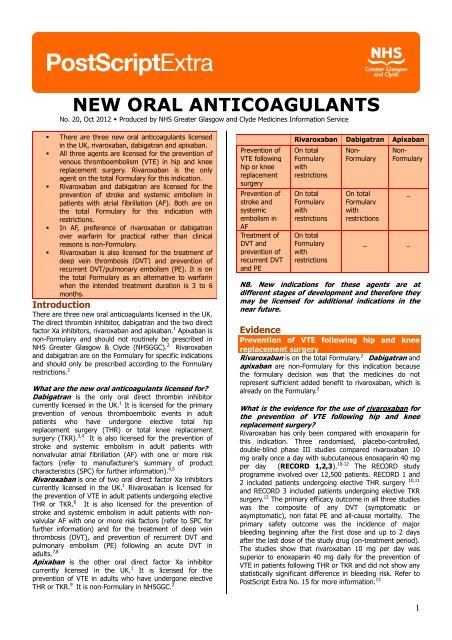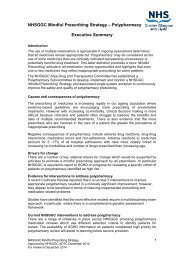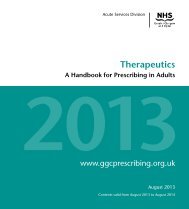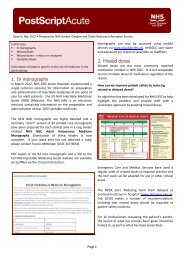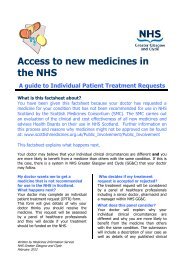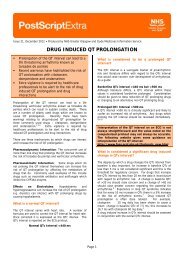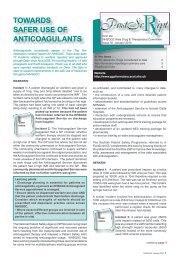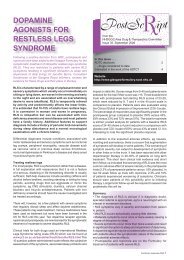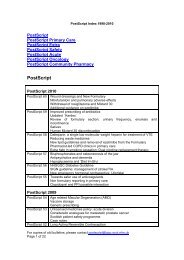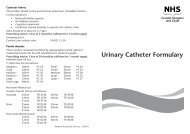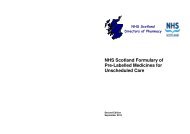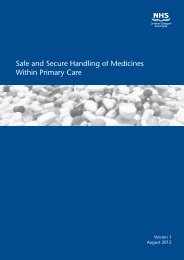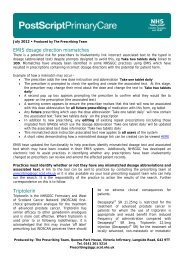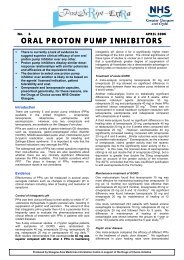NEW ORAL ANTICOAGULANTS - GGC Prescribing
NEW ORAL ANTICOAGULANTS - GGC Prescribing
NEW ORAL ANTICOAGULANTS - GGC Prescribing
You also want an ePaper? Increase the reach of your titles
YUMPU automatically turns print PDFs into web optimized ePapers that Google loves.
<strong>NEW</strong> <strong>ORAL</strong> <strong>ANTICOAGULANTS</strong><br />
No. 20, Oct 2012 Produced by NHS Greater Glasgow and Clyde Medicines Information Service<br />
<br />
<br />
<br />
<br />
<br />
There are three new oral anticoagulants licensed<br />
in the UK, rivaroxaban, dabigatran and apixaban.<br />
All three agents are licensed for the prevention of<br />
venous thromboembolism (VTE) in hip and knee<br />
replacement surgery. Rivaroxaban is the only<br />
agent on the total Formulary for this indication.<br />
Rivaroxaban and dabigatran are licensed for the<br />
prevention of stroke and systemic embolism in<br />
patients with atrial fibrillation (AF). Both are on<br />
the total Formulary for this indication with<br />
restrictions.<br />
In AF, preference of rivaroxaban or dabigatran<br />
over warfarin for practical rather than clinical<br />
reasons is non-Formulary.<br />
Rivaroxaban is also licensed for the treatment of<br />
deep vein thrombosis (DVT) and prevention of<br />
recurrent DVT/pulmonary embolism (PE). It is on<br />
the total Formulary as an alternative to warfarin<br />
when the intended treatment duration is 3 to 6<br />
months.<br />
Introduction<br />
There are three new oral anticoagulants licensed in the UK.<br />
The direct thrombin inhibitor, dabigatran and the two direct<br />
factor Xa inhibitors, rivaroxaban and apixaban. 1 Apixaban is<br />
non-Formulary and should not routinely be prescribed in<br />
NHS Greater Glasgow & Clyde (NHS<strong>GGC</strong>). 2 Rivaroxaban<br />
and dabigatran are on the Formulary for specific indications<br />
and should only be prescribed according to the Formulary<br />
restrictions. 2<br />
What are the new oral anticoagulants licensed for?<br />
Dabigatran is the only oral direct thrombin inhibitor<br />
currently licensed in the UK. 1 It is licensed for the primary<br />
prevention of venous thromboembolic events in adult<br />
patients who have undergone elective total hip<br />
replacement surgery (THR) or total knee replacement<br />
surgery (TKR). 3,4 It is also licensed for the prevention of<br />
stroke and systemic embolism in adult patients with<br />
nonvalvular atrial fibrillation (AF) with one or more risk<br />
factors (refer to manufacturer's summary of product<br />
characteristics (SPC) for further information). 4,5<br />
Rivaroxaban is one of two oral direct factor Xa inhibitors<br />
currently licensed in the UK. 1 Rivaroxaban is licensed for<br />
the prevention of VTE in adult patients undergoing elective<br />
THR or TKR. 6 It is also licensed for the prevention of<br />
stroke and systemic embolism in adult patients with nonvalvular<br />
AF with one or more risk factors (refer to SPC for<br />
further information) and for the treatment of deep vein<br />
thrombosis (DVT), and prevention of recurrent DVT and<br />
pulmonary embolism (PE) following an acute DVT in<br />
adults. 7,8<br />
Apixaban is the other oral direct factor Xa inhibitor<br />
currently licensed in the UK. 1 It is licensed for the<br />
prevention of VTE in adults who have undergone elective<br />
THR or TKR. 9 It is non-Formulary in NHS<strong>GGC</strong>. 2<br />
Prevention of<br />
VTE following<br />
hip or knee<br />
replacement<br />
surgery<br />
Prevention of<br />
stroke and<br />
systemic<br />
embolism in<br />
AF<br />
Treatment of<br />
DVT and<br />
prevention of<br />
recurrent DVT<br />
and PE<br />
Rivaroxaban Dabigatran Apixaban<br />
On total<br />
Formulary<br />
with<br />
restrictions<br />
On total<br />
Formulary<br />
with<br />
restrictions<br />
On total<br />
Formulary<br />
with<br />
restrictions<br />
Non-<br />
Formulary<br />
On total<br />
Formulary<br />
with<br />
restrictions<br />
Non-<br />
Formulary<br />
NB. New indications for these agents are at<br />
different stages of development and therefore they<br />
may be licensed for additional indications in the<br />
near future.<br />
Evidence<br />
Prevention of VTE following hip and knee<br />
replacement surgery<br />
Rivaroxaban is on the total Formulary. 2 Dabigatran and<br />
apixaban are non-Formulary for this indication because<br />
the formulary decision was that the medicines do not<br />
represent sufficient added benefit to rivaroxaban, which is<br />
already on the Formulary. 2<br />
What is the evidence for the use of rivaroxaban for<br />
the prevention of VTE following hip and knee<br />
replacement surgery?<br />
Rivaroxaban has only been compared with enoxaparin for<br />
this indication. Three randomised, placebo-controlled,<br />
double-blind phase III studies compared rivaroxaban 10<br />
mg orally once a day with subcutaneous enoxaparin 40 mg<br />
per day (RECORD 1,2,3). 10-12 The RECORD study<br />
programme involved over 12,500 patients. RECORD 1 and<br />
2 included patients undergoing elective THR surgery 10,11<br />
and RECORD 3 included patients undergoing elective TKR<br />
surgery. 12 The primary efficacy outcome in all three studies<br />
was the composite of any DVT (symptomatic or<br />
asymptomatic), non fatal PE and all-cause mortality. The<br />
primary safety outcome was the incidence of major<br />
bleeding beginning after the first dose and up to 2 days<br />
after the last dose of the study drug (on-treatment period).<br />
The studies show that rivaroxaban 10 mg per day was<br />
superior to enoxaparin 40 mg daily for the prevention of<br />
VTE in patients following THR or TKR and did not show any<br />
statistically significant difference in bleeding risk. Refer to<br />
PostScript Extra No. 15 for more information. 13<br />
_<br />
_<br />
_<br />
1
What is the evidence for the use of dabigatran for<br />
the prevention of VTE following hip and knee<br />
replacement surgery?<br />
Dabigatran has only been compared with enoxaparin for<br />
this indication. Dabigatran was shown to be non-inferior to<br />
enoxaparin for the prevention of VTE after THR and TKR<br />
surgery in the RE-NOVATE 14 (n=3494) and RE-MODEL 15<br />
(n=2076) studies respectively. Patients were randomised to<br />
either dabigatran 150 mg or 220 mg once daily or<br />
enoxaparin 40 mg once daily. Both doses of dabigatran<br />
were shown to be non-inferior to enoxaparin for the<br />
primary efficacy outcome (a composite of total VTE<br />
(venographic or symptomatic) and mortality) during<br />
treatment in both studies. There was no statistically<br />
significant difference in the primary safety outcome of<br />
bleeding rates between either dose of dabigatran and<br />
enoxaparin in either trial.<br />
What is the evidence for the use of apixaban for the<br />
prevention of VTE following hip and knee<br />
replacement surgery?<br />
Apixaban has only been compared with enoxaparin for this<br />
indication. Apixaban was shown to be similar to enoxaparin<br />
for the prevention of VTE after TKR and THR surgery in the<br />
ADVANCE-2 16 (n=3057) and ADVANCE-3 17 (n=5407)<br />
studies respectively. Patients were randomly allocated to<br />
receive apixaban 2.5 mg twice daily or enoxaparin 40 mg<br />
once daily. Apixaban was shown to be superior to<br />
enoxaparin for the primary outcome, a composite of<br />
asymptomatic or symptomatic DVT, non-fatal PE, and allcause<br />
mortality during treatment, in both studies.<br />
There was no statistically significant difference in the<br />
primary safety outcome of major or clinically relevant nonmajor<br />
bleeding between apixaban and enoxaparin in either<br />
study.<br />
Prevention of stroke and systemic embolism in<br />
AF<br />
What is the evidence for the use of rivaroxaban for<br />
the prevention of stroke and systemic embolism in<br />
AF?<br />
Rivaroxaban has only been compared with warfarin for this<br />
indication. Rivaroxaban was shown to be non-inferior to<br />
warfarin for the prevention of the primary outcome of<br />
stroke and systemic embolism in patients with AF in the<br />
double blind ROCKET-AF (n=14264) study. 18 The study<br />
primarily assessed the non-inferiority of rivaroxaban to<br />
warfarin and if non-inferiority was confirmed, tests for<br />
superiority were performed. Patients with nonvalvular AF at<br />
moderate to high risk of stroke were randomised to receive<br />
rivaroxaban 15 mg or 20 mg per day (depending on<br />
creatinine clearance) or dose adjusted warfarin (to<br />
maintain an INR of 2-3). The median follow up period was<br />
approximately two years. In the intention-to-treat (ITT)<br />
analysis, the primary end point of stroke or systemic<br />
embolism occurred in 2.1% of patients per year in the<br />
rivaroxaban group compared to 2.4% of patients per year<br />
in the warfarin group (HR, 0.88, 95%CI 0.74-1.03,<br />
p
Treatment of DVT and prevention of recurrent<br />
DVT and PE<br />
What is the evidence for the use of rivaroxaban for<br />
the treatment of DVT and prevention of recurrent<br />
DVT and PE?<br />
Rivaroxaban has only been compared with enoxaparin<br />
followed by dose adjusted vitamin K antagonist (VKA)<br />
(warfarin or acenocoumarol) for this indication.<br />
Rivaroxaban was shown to be non-inferior to enoxaparin-<br />
VKA for the prevention of recurrent VTE in the EINSTEIN-<br />
DVT study. 20 EINSTEIN-DVT was a randomised, open<br />
label, non-inferiority trial comparing rivaroxaban (15 mg<br />
twice daily for three weeks followed by 20 mg once daily)<br />
with enoxaparin (1 mg/kg BD) followed by a dose adjusted<br />
VKA (either warfarin or acenocoumarol) for 3, 6 or 12<br />
months in 3449 patients with acute, symptomatic DVT. It<br />
should be noted that the enoxaparin dose used in the<br />
study, 1 mg/kg BD, is higher than the UK licensed dose of<br />
1.5 mg/kg daily for the treatment of VTE. 1 It is uncertain if<br />
there are significant implications of this. The primary<br />
efficacy outcome of recurrent VTE occurred in 2.1% of the<br />
rivaroxaban group versus 3% of patients in the enoxaparin-<br />
VKA group (HR, 0.68, 95%CI, 0.44-1.04, p
duration of treatment is 3 to 6 months. Where indefinite<br />
duration is indicated, then the treatment of choice should<br />
be a low molecular weight heparin followed by warfarin. 2<br />
The initial 21 days of therapy is dispensed from hospital<br />
pharmacy. Further guidance has been produced by the<br />
Thrombosis Committee and is available on StaffNet.<br />
<strong>Prescribing</strong> advice<br />
<strong>Prescribing</strong> information can change, therefore, always refer<br />
to the latest version of the SPC at<br />
http://emc.medicines.org.uk for full information before<br />
prescribing any of the new agents. A number of medicines<br />
are contraindicated or should be used with caution with<br />
rivaroxaban and dabigatran. When prescribing any new<br />
medicines for patients currently on a new anticoagulant,<br />
always refer to the SPC to check for interactions.<br />
Cost for 28 days treatment (Scottish drug tariff/eMIMS Sep 2012)<br />
Enoxaparin 40mg OD<br />
Dabigatran 150mg BD<br />
Dabigatran 220mg OD/110mg BD<br />
Rivaroxaban 20mg OD<br />
Rivaroxaban 10mg OD<br />
Dalteparin 15,000units OD* + Warfarin 5mg OD<br />
Warfarin 3mg OD<br />
Aspirin 75mg OD<br />
£0.89<br />
£0.78<br />
£61.50<br />
£61.50<br />
£58.80<br />
£58.80<br />
£43.27<br />
£84.76<br />
NB. Doses shown<br />
are for general<br />
comparison only<br />
and do not imply<br />
therapeutic<br />
equivalence.<br />
(*Price for dalteparin<br />
assumes person<br />
weighing 70kg<br />
receiving treatment<br />
for 5 days)<br />
£0 £10 £20 £30 £40 £50 £60 £70 £80 £90<br />
References<br />
1. British National Formulary (BNF), No 63, March 2012.<br />
2. NHS Greater Glasgow and Clyde Formulary. Accessed via<br />
www.ggcprescribing.org.uk on 10/07/12.<br />
3. Summary of Product Characteristics – Pradaxa® 75mg.<br />
Boehringer Ingelheim ltd. Accessed via<br />
http://emc.medicines.org.uk on 08/05/12 [last updated on eMC<br />
20/04/12].<br />
4. Summary of Product Characteristics – Pradaxa® 110mg.<br />
Boehringer Ingelheim ltd. Accessed via<br />
http://emc.medicines.org.uk on 08/05/12 [last updated on eMC<br />
01/05/12].<br />
5. Summary of Product Characteristics – Pradaxa® 150mg.<br />
Boehringer Ingelheim. Accessed via http://emc.medicines.org.uk<br />
on 08/05/12 [last updated on eMC 30/04/12].<br />
6. Summary of Product Characteristics – Xarelto® 10mg. Bayer<br />
plc. Accessed via http://emc.medicines.org.uk on 08/05/12 [last<br />
updated on eMC 20/12/11].<br />
7. Summary of Product Characteristics – Xarelto® 15mg. Bayer<br />
plc. Accessed via http://emc.medicines.org.uk on 08/05/12 [last<br />
updated on eMC 20/12/11].<br />
8. Summary of Product Characteristics – Xarelto® 20mg. Bayer<br />
plc. Accessed via http://emc.medicines.org.uk on 08/05/12 [last<br />
updated on eMC 20/12/11].<br />
9. Summary of Product Characteristics – Eliquis® 2.5mg. Bristol-<br />
Myers Squibb-Pfizer. Accessed via http://emc.medicines.org.uk on<br />
04/05/12 [last updated on eMC 19/09/11].<br />
10. Eriksson BI et al. Rivaroxaban versus enoxaparin for<br />
thromboprophylaxis after hip arthroplasty. The New England<br />
Journal of Medicine (NEJM) 2008; 358:2765-75.<br />
11. Kakkar AK et al. Extended duration rivaroxaban versus shortterm<br />
enoxaparin for the prevention of venous thromboembolism<br />
after total hip arthroplasty: a double-blind, randomised controlled<br />
trial. Lancet 2008; 372:31-39.<br />
12. Lassen MR et al. Rivaroxaban versus enoxaparin for<br />
thromboprophylaxis after total knee arthroplasty. The New England<br />
Journal of Medicine 2008; 358:2776-86.<br />
13. NHS Greater Glasgow and Clyde. PostScript Extra. Rivaroxaban<br />
– a new oral anticoagulant, No. 15, Aug 2009. Accessed via<br />
www.ggcprescribing.org.uk.<br />
14. Eriksson BI et al. Dabigatran etexilate versus enoxaparin for<br />
prevention of venous thromboembolism after total hip<br />
replacement: a randomised, double-blind, non-inferiority trial.<br />
Lancet 2007; 370:949-956.<br />
15. Eriksson BI et al. Oral dabigatran etexilate vs. subcutaneous<br />
enoxaparin for the prevention of venous thromboembolism after<br />
total knee replacement: the RE-MODEL randomized trial. Journal<br />
of thrombosis and haemostasis 2007; 5:2178-2185.<br />
16. Lassen MR et al. Apixaban versus enoxaparin for<br />
thromboprophylaxis after knee replacement (ADVANCE-2): a<br />
randomised double-blind trial. Lancet 2010; 375:807-1.<br />
17. Lassen MR et al. Apixaban versus enoxaparin for<br />
thromboprophylaxis after hip replacement. NEJM 2010; 363:2487-<br />
98.<br />
18. Patel MR et al. Rivaroxaban versus warfarin in nonvalvular<br />
atrial fibrillation. NEJM 2011; 365:883-91.<br />
19. Connolly SJ et al. Dabigatran versus warfarin in patients with<br />
atrial fibrillation. NEJM 2009; 361:1139-51.<br />
20. Bauersachs R et al. Oral rivaroxaban for symptomatic venous<br />
thromboembolism. NEJM 2010; 363:2499-510.<br />
21. Bayer AG seeks EU approval for Xarelto for pulmonary<br />
embolism 12/04/12. Biospace. Accessed via<br />
http://www.biospace.com/News/bayer-ag-seeks-eu-approval-ofxarelto-for/256159/source=TopBreaking.<br />
22. The EINSTEIN-PE investigators. Oral rivaroxaban for the<br />
treatment of symptomatic pulmonary embolism. NEJM 2012;<br />
366:1287-97.<br />
23. Medicines and Healthcare products Regulatory Agency<br />
(MHRA). Drug Safety Update, Vol. 5, Issue 5, Dec 2011. Accessed<br />
via<br />
http://www.mhra.gov.uk/Safetyinformation/DrugSafetyUpdate/inde<br />
x.htm.<br />
24. Miller CS et al. Meta-Analysis of efficacy and safety of new oral<br />
anticoagulants (dabigatran, rivaroxaban, apixaban) versus warfarin<br />
in patients with atrial fibrillation. American Journal of Cardiology<br />
2012. Published online<br />
http://dx.doi.org/10.1016/j.amjcard.2012.03.049.<br />
25. NHS Greater Glasgow and Clyde. Therapeutics – A Handbook<br />
for prescribing in adults 2012.<br />
26. NHS Greater Glasgow and Clyde. Thromboprophylaxis<br />
guidelines for orthopaedic patients 2012.<br />
Produced by NHS Greater Glasgow and Clyde Medicines Information Service ♦ Approved by the Medicines Utilisation<br />
Subcommittee of the ADTC ♦ Tel: 0141 211 4407 Email: medinfo@ggc. scot.nhs.uk<br />
NOT TO BE USED FOR COMMERCIAL OR MARKETING PURPOSES TO BE REVIEWED 2 YEARS FROM DATE OF<br />
PUBLICATION<br />
4


